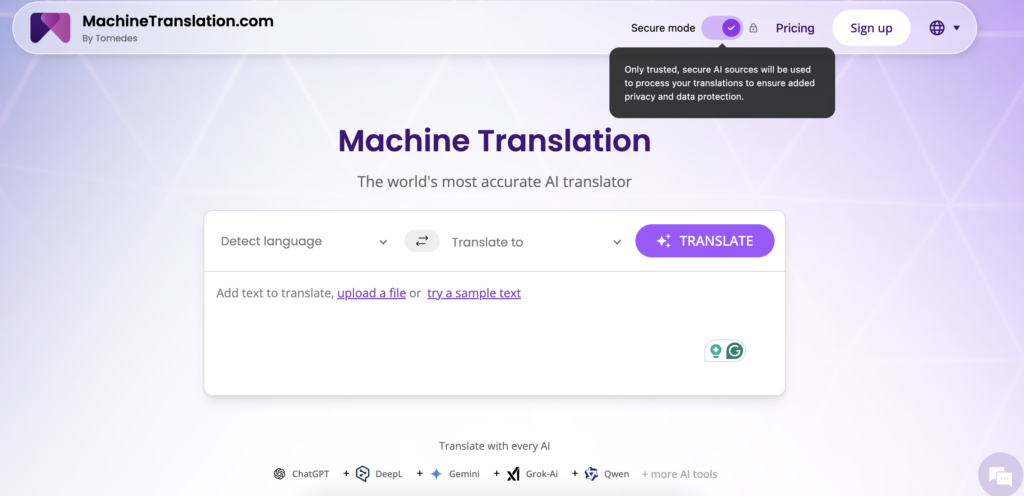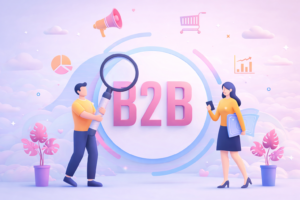Businesses are expanding beyond borders at an unprecedented rate.
With over 350 languages currently spoken in the United States (a number that has nearly tripled since 1980), the need for effective international business communication has never been more critical.
While many companies invest heavily in marketing, technology, and customer acquisition, they often overlook a fundamental growth enabler: secure document translation.
The global translation services market tells a compelling story of growth and opportunity.
The global translation market reached $56 billion in 2021 and is projected to grow at a CAGR of 5.94%, reaching approximately USD 96.21 billion by 2032.
This growth reflects not just demand for translation services but the critical role they play in business expansion.
However, as businesses increasingly rely on digital platforms for document sharing and translation, security concerns have become paramount.
Deloitte’s 2024 survey showed that more and more enterprises rank data privacy and security as their top concern when adopting AI.
For companies handling sensitive business documents, secure document translation isn’t just a compliance requirement, but a strategic growth hack that builds trust, accelerates deals, and protects valuable intellectual property.
Why Document Security Matters in Translation

The risks of insecure translation practices extend far beyond simple data breaches.
When confidential business documents are mishandled during translation, companies face a cascade of potential consequences that can cripple growth initiatives and damage hard-earned reputations.
Data breaches in translation workflows can expose sensitive information to unauthorized parties, leading to financial losses, legal penalties, and irreparable damage to client trust.
Consider the types of documents businesses regularly need translated: merger and acquisition agreements, financial reports, patent applications, proprietary research data, employee contracts, and strategic business plans.
Each document contains information that competitors would find invaluable and that regulatory bodies require to be protected.
Legal ramifications can be severe when document security is compromised.
Companies operating in regulated industries face particular challenges, as they must comply with stringent data protection requirements while maintaining operational efficiency.
GDPR violations alone can result in fines of up to 4% of annual global turnover, while HIPAA violations in healthcare can lead to penalties ranging from $100 to $50,000 per violation.
The loss of client trust, however, may be the most damaging consequence.
When international partners discover that their confidential information has been compromised during translation, it often signals the end of business relationships and can tarnish a company’s reputation in entire markets.
This is particularly devastating for businesses trying to establish themselves in new international territories where trust is the foundation of successful partnerships.
How Does Secure Translation Impact Business Growth?
The connection between secure document translation and business growth might not be immediately obvious, but the impact is profound and measurable.
When businesses prioritize translation security, they create a competitive advantage that directly contributes to expansion success.
Building trust with international partners becomes significantly easier when businesses can demonstrate robust security protocols.
Prospective clients and partners are more likely to share sensitive information and move forward with negotiations when they have confidence in a company’s data handling practices.
This trust acceleration often translates into faster deal closures and more favorable terms, as partners feel secure sharing the detailed information necessary for comprehensive business agreements.
Risk mitigation plays a key role in business growth velocity.
When companies implement secure translation processes, they reduce the likelihood of security incidents that could derail expansion plans.
A single data breach can halt international negotiations, trigger regulatory investigations, and require extensive resources to remediate, resources that would otherwise be invested in growth initiatives.
Enhanced brand reputation in international markets becomes a powerful growth driver.
Companies known for maintaining high security standards often receive preferential treatment from partners, suppliers, and customers.
This reputation for security and professionalism can open doors to opportunities that might not be available to competitors with less robust security practices.
Is it Safe to use an AI Translation tool for Confidential Documents?
One of the most frequently asked questions in business translation concerns the safety of popular free translation tools for confidential documents.
The short answer is NO.
Free AI translation tools and similar free services are not appropriate for confidential business documents.
Free translation services typically store and analyze uploaded content to improve their algorithms, meaning that confidential information may be retained, processed, and potentially accessed by unauthorized parties.
These platforms lack the security certifications and compliance frameworks necessary for handling sensitive business data, making them unsuitable for professional translation needs.
For businesses requiring secure translation of confidential documents, professional translation services that offer encrypted file transfer, secure cloud platforms, and compliance with industry standards provide the necessary security framework.
These services implement robust access controls, audit trails, and data protection measures that free translation tools simply cannot match.
Read More: Service-Based Businesses Can Build Stronger Local Presence
3 Common Challenges in Document Translation
Professional document translation involves several complex challenges that, when not properly addressed, can compromise both security and accuracy.
Understanding these challenges is important for businesses developing effective translation strategies.

Preserving document formatting while maintaining security presents a significant challenge.
Complex business documents often contain tables, charts, graphs, and specialized layouts that must be maintained across languages while ensuring that formatting metadata doesn’t compromise security protocols.
Professional translation services invest in specialized software and processes to handle these requirements without exposing sensitive information.
Translating complex technical or financial content accurately requires specialized expertise that goes beyond linguistic skills.
Financial documents contain specific terminology, regulatory language, and numerical data that must be translated with absolute precision.
Any errors in this content can have serious legal and financial implications, making the selection of qualified translators with subject matter expertise essential.
Maintaining confidentiality across digital platforms becomes increasingly challenging as translation workflows become more complex.
Documents may need to be accessed by multiple translators, project managers, and quality assurance specialists across different geographic locations.
Secure translation providers implement comprehensive access controls, encryption protocols, and audit systems to maintain confidentiality throughout these complex workflows.
How Does Technology Enhance Secure Translation?
Modern translation technology has revolutionized how businesses approach secure document translation, offering sophisticated solutions that balance efficiency with security requirements.
AI and machine translation have evolved significantly, offering secure environments for processing sensitive documents.
Platforms like MachineTranslation.com provide accurate translation with enterprise-grade security features, including end-to-end encryption and compliance with major data protection regulations.

MachineTranslation.com’s Secure Mode is HIPAA, GDPR, and SOC 2-compliant with professional accuracy, demonstrating how modern technology can address both accuracy and security requirements simultaneously.
Hybrid translation approaches combine the efficiency of AI with human expertise to ensure optimal results for sensitive documents.
This approach allows businesses to leverage machine translation for initial drafts while ensuring that human translators with appropriate security clearances review and refine the content.
The hybrid model is particularly effective for large volumes of documents where complete human translation would be prohibitively time-consuming or expensive.
Secure cloud platforms and encrypted file transfer protocols have become standard features of professional translation services.
These platforms implement multi-layer security architectures that protect documents throughout the translation process, from initial upload through final delivery.
Features include encrypted storage, secure access controls, audit logging, and automatic deletion of processed files according to predefined schedules.
According to a 2024 PwC consumer trust survey, only 30% of consumers trust companies to use AI responsibly with their data, so a lack of transparency directly erodes brand credibility.
Some platforms now offer privacy-focused features such as Secure Mode or private API deployment.
Best Practices for Secure Document Translation
Implementing effective secure translation practices requires a systematic approach that addresses technology, processes, and human factors.
Organizations should establish comprehensive frameworks that protect sensitive information while enabling efficient translation workflows.
Vetting translation providers for confidentiality policies should be the first step in any secure translation initiative.
Organizations should require potential providers to demonstrate compliance with relevant industry standards, provide evidence of security certifications, and outline their data handling practices in detail.
Key evaluation criteria should include encryption standards, access controls, employee background checking processes, and incident response procedures.
Using non-disclosure agreements (NDAs) and secure project management tools creates legal and technical frameworks for protecting confidential information.
NDAs should specifically address translation activities, data retention policies, and security breach notification requirements.
Project management platforms should provide encrypted communication channels, secure file sharing capabilities, and detailed audit trails that track all access to sensitive documents.
Regular audits and compliance checks ensure that security measures remain effective over time.
Organizations should conduct periodic reviews of their translation providers’ security practices, monitor compliance with established protocols, and update security requirements based on evolving threats and regulatory changes.
This ongoing vigilance helps identify potential vulnerabilities before they can be exploited.
Employee training on secure translation practices is equally important.
Staff members who initiate translation requests should understand security requirements, know how to properly classify document sensitivity levels, and follow established protocols for working with translation providers.
Regular training updates help maintain awareness of emerging security threats and best practices.
Case Studies and Success Stories
The practical benefits of secure translation become even more evident when examining real-world implementations, each aligned with a specific translation workflow.
1. AI Translation for Internal Reviews – Technology Sector
A global software company expanding into Latin America used AI translation to rapidly localize internal product documentation, engineering specs, and onboarding materials.
By automating translation for non-public-facing content, the company reduced internal localization turnaround by over 60%.
This allowed their teams in Mexico, Brazil, and Colombia to begin operations in parallel, accelerating time-to-market.
Because the documents were used internally, the company balanced speed and scalability without compromising sensitive customer data, which remained protected in isolated, encrypted environments.
2. Human Translators for Legal Compliance – Legal Services Firm
A U.S.-based legal consultancy entering the EU market relied on certified human translators to localize contracts, GDPR compliance documentation, and regulatory filings.
With jurisdiction-specific legal terminology and strict submission requirements, the firm prioritized human translation to ensure complete accuracy and legal validity.
The decision prevented costly delays and ensured that all documentation met the standards of EU regulators.
As a result, the firm successfully secured a major government contract within five months of entering the region.
3. Hybrid Workflow for Marketing Collateral – Financial Services Provider
A fintech company expanding into Southeast Asia adopted a hybrid translation workflow to localize its marketing campaigns and customer-facing materials.
Initial translations were generated using AI to accelerate the process, followed by expert human review to refine tone, terminology, and cultural relevance.
This approach reduced localization costs by 40% and cut production time by half while maintaining brand consistency across languages.
Post-campaign analysis revealed a 2.3x increase in user engagement compared to previous markets.
These examples show how choosing the right translation strategy (AI, human, or hybrid) can align with business goals while upholding security, quality, and efficiency across diverse use cases.
Which Translator is Accepted for Legal Documents?
For businesses requiring legal document translation, the choice of translator becomes critical not only for accuracy but also for legal validity and security.
Certified translators who specialize in legal documents and maintain appropriate security clearances provide the necessary combination of expertise and confidentiality required for sensitive legal materials.
Legal document translation demands professionals with specific qualifications, including deep knowledge of legal terminology, familiarity with different legal systems, and often certification from recognized translation organizations.
Many jurisdictions have strict requirements for translated legal documents, especially for court submissions, regulatory filings, and immigration procedures.
Today, organizations can choose between AI-powered translation, human translation, or a hybrid workflow, depending on the document’s purpose, urgency, and required level of accuracy.
- AI translation offers speed and scalability for internal reviews or preliminary drafts.
- Human translators ensure compliance, contextual understanding, and legal validity.
- Hybrid translation or human in the loop combines both approaches, using AI for efficiency and human oversight for precision and compliance.
This flexible approach helps businesses meet tight deadlines while maintaining the standards expected for legal content.
Conclusion
Secure document translation is far more than a compliance requirement; it’s a strategic growth driver.
Businesses that prioritize security in translation build trust, accelerate deals, and protect their most valuable assets.
With the global translation market continuing to expand, companies that combine accuracy with robust data protection will gain a clear competitive edge.
The message is simple: in today’s global marketplace, trust is the currency of growth. Secure translation lays the foundation for sustainable international success.
The question isn’t whether you should invest in secure translation, it’s whether you can afford not to.








